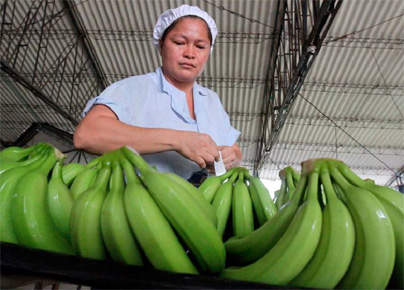Latam Growers Reject EU Importers Proposal to Pay Less for Bananas
2023-12-22

Latin American banana growers expressed concern that European supermarkets are asking for a reduction of 1.30 euros (US$1.43) on the price of a box of bananas.
Currently, producing a box of bananas on a Colombian farm costs around US$7.8, equivalent to about 7.10 euros, so the impact of the alleged European reduction would be 0.52 euros per box for Colombian growers.
The banana clusters of Ecuador and Peru, together with producers from Colombia, the Dominican Republic, Guatemala, Honduras and Costa Rica, were surprised to learn that the supermarkets of the old continent are once again seeking to reduce the purchase price of bananas and urged that "shared responsibility is not only an initiative that remains under discussion but that effective measures be adopted to respond by their role in the supply chain by paying a fair price per box of bananas".
They also recalled that since 2020, Latin American banana producers and exporters have experienced significant problems, such as the dramatic increase in input costs, such as cardboard, freight, and fertilisers, which, at present, do not even reach pre-pandemic levels.
"The region has experienced the serious threat of the presence of FOC TR4 (Fusarium Tropical Race 4) in Colombia, Peru and Venezuela; imposing the need to make greater investments in countries with the presence of the pest to prevent its spread and in countries where the disease is not yet present to prevent its entry," reads a statement from the banana growers.
They also highlighted the increased insecurity in the region caused by cargo contamination and criminal acts in productive areas, which is a product of the growth in demand for illicit substances and the absence of public health policies in the European Union, for example, to address this problem of transnational scale, which has resulted in more significant investment for the region to ensure security in the supply chain. Banana farmers added that they have had to adapt production practices to the certification standards required by supermarkets, as well as to policies based on anti-technical premises promoted by the European Union under the Green Pact and the farm-to-table strategy, which do not consider the production needs of the different regions or sound risk management principles, thus causing the withdrawal of important crop protection molecules, which has also generated higher costs and an increase in fruit shrinkage or rejection for aesthetic considerations by supermarkets and buyers, thus producing a painful rise in human food waste. "Unfortunately, in 2020, 2021, and 2022, the supermarkets did not recognise these realities but decided to reduce banana prices further. These decisions, inconsistent with the objective of sustainable trade, have called us, on behalf of producers and exporters in the region affected by these unsustainable practices, to tirelessly demand that supermarkets assume their role within the shared responsibility materialised in the payment of a fair price per box of bananas that responds to production costs and sustainability requirements," emphasised the Latin American banana growers.
For banana entrepreneurs, the actions of European supermarkets should not focus on distracting the discussion to third organisations and entities that do not focus on the real problem, which is the absence of a fair price and do not consider the particularities and efforts of each country such as Colombia, which has mechanisms for dialogue between producers and workers to establish a living wage, or Ecuador, which has a living wage set by the Constitution and the law.
"We reiterate that the payment of a fair price is indispensable to achieve and maintain sustainable productions. If supermarkets continue to evade their role within the supply chain in the framework of shared responsibility, they will continue to demonstrate the incongruence between the sustainable practices required from producers and the commercial practices of supermarkets that increasingly seek to obtain lower prices regardless of their effect on sustainable agriculture, thus turning sustainability into a mere empty statement, "the producers concluded.









